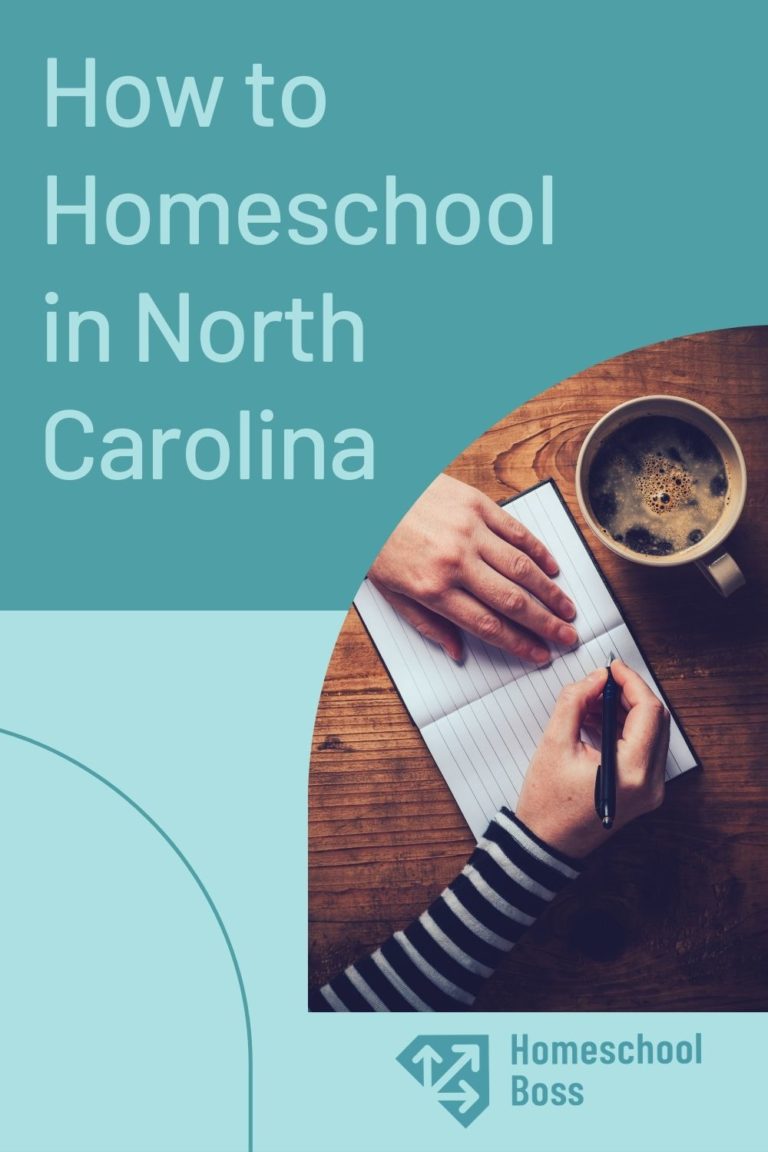
Need to know how to begin homeschooling in North Carolina? Here’s an overview of what’s required to register your homeschool and maintain compliance once you begin.
Registering to Homeschool in North Carolina
North Carolina is considered to be moderately regulated in terms of homeschool laws, but it’s generally easy to comply with the regulations. To meet registration requirements, parents or guardians must file a Notice of Intent with the Division of Non-Public Education (DNPE). This process can be completed through their website and involves submitting documentation of a high school diploma, GED, or higher education degree for all parents or guardians who will provide the academic instruction.
This is a one-time process and will also include defining your homeschool as religious or non-religious and providing a name for your homeschool. While submitting that name, keep in mind that it’s wise to avoid names that would draw negative attention on a high school diploma or future applications for employment and college. If you lack inspiration for naming your homeschool, consider something like Yourtown Academy.
Also, since North Carolina compulsory age is 7, you must file a Notice of Intent to Homeschool when the homeschooled child turns 7. To avoid gaps that result in truancy, it’s recommended that parents file the Notice of Intent five days before the child’s seventh birthday.
Withdrawing from Public or Private School to Homeschool
If you are planning to homeschool a child who is currently enrolled in a public or private school, you must file the Notice of Intent to Homeschool and receive written confirmation that your Notice of Intent was received before withdrawing. When you receive confirmation, you may contact the current school or school board to begin the withdrawal process for your child.
You Registered Your North Carolina Homeschool. Now What?
As a North Carolina home educator, you have the freedom to choose the subjects, curricula, and educational methods that will guide your homeschool plans, but North Carolina’s DNPE does require the following for homeschoolers:
- Operate on a consistent schedule for at least nine months each year. This excludes vacations and holidays.
- Administer nationally standardized testing each year for all children receiving instruction in your homeschool, like NWEA MAP Growth assessments. Testing is required to measure spelling, grammar, reading and mathematics skills for each enrolled student and serves to help homeschooling parents track progress or address academic concerns. (See What You Need to Know About North Carolina Homeschool Testing to learn more.)
- Provide address changes and annual enrollment updates via DNPE website.
- Close your homeschool by notifying DNPE if your homeschool is no longer in operation. You can reopen it by filing a Notice of Intent to Re-open if needed in the future.
As an administrator for your homeschool, you must also maintain the following records for each academic year and provide them if requested by an official from the Division of Non-Public Education:
- Attendance – You can keep a record of attendance however you wish, but you are welcome to take advantage of the free printable attendance template provided on the Division of Non-Public Education’s homepage.
- Immunizations – These records are based on requirements for schools and child care facilities.
- Standardized Testing Results – While you don’t have to provide the results themselves unless asked specifically, you are asked to enter the test dates and type of testing into the DNPE database via your account each year. We recommend NWEA MAP Growth Assessments.
It’s unlikely that you’ll be audited by an official, but maintaining these records and having them easily accessible will help you avoid unnecessary problems, including the closing of your homeschool, that could arise from poor recordkeeping.
Further Recommendations for Homeschooling in North Carolina
While there are no specific teaching or administrative requirements for homeschooling in North Carolina, DNPE does offer recommendations in these areas.
Academic Instruction and Operation
You have the freedom to approach educational instruction through your teaching method of choice, but it’s recommended that homeschooled children receive instruction similar in scope, quality, and duration of what they would receive from a public or private school. Parents may choose to operate within these parameters or not, but they serve as a valuable frame of reference for students who might transition to a public or private school at some point.
The Division of Non-public Education also recommends that students receive five hours of instruction each day. Again, that’s a recommendation, but not a requirement.
Administrative and Recordkeeping Guidelines
As a homeschooling parent, you are your child’s school administrator. That means you’re also the person responsible for keeping track of academic records for your child and providing information about his education if asked. Because of that, DNPE recommends that you maintain a lesson plan or log of instruction received. You will need to keep records of these plans until graduation or enrollment in a public or private school.
In addition to lesson planning records, it’s also wise to keep information about the materials used for instruction and examples of your child’s schoolwork itself. Whether this happens through an academic portfolio or samples of schoolwork, the record will prove helpful if you need to provide details about his time being homeschooled in the future.
Suggestions for High School Transcripts
North Carolina’s DNPE also provides suggestions for homeschooled students who are graduating high school and entering college. The division itself doesn’t provide high school diplomas or transcripts, but does provide guidance on what to include for homeschool administrators who are preparing transcripts for their students:
- The name, address, and telephone number for your homeschool as registered with DNPE.
- All completed subjects listed according to academic year.
- Any courses completed at a public or private school, including grades received, listed as transferred subjects.
- Grades received and units of credit earned for each subject listed.
- Yearly standardized test scores.
- Date of high school graduation.
If you are unsure of specific subjects to offer while homeschooling the high school years, see the public school graduation requirements listed in DNPE’s free Homeschool Guidebook. You can also check with potential college choices for your student and use their admissions requirements as a guideline for high school instruction and a framework for the transcript.
Connecting with Other North Carolinian Homeschoolers
Lastly, remember that connecting with other homeschool families is an important way for homeschooling parents and children to receive support. North Carolina has a fairly large number of homeschoolers, so it’s not usually difficult to find homeschooling families nearby. To connect with other families for support or gatherings, contact groups in your region .

Emily Copeland
Emily Copeland is a homeschool mom of two living in coastal North Carolina. She offers help and hope for the homeschool journey at tablelifeblog.com. You can also find her on Pinterest, Instagram, and Twitter.
